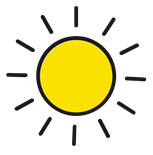Sunshine has been shown to improve our mood because it produces ‘feel good’ hormones, as well as chemicals that help us concentrate, and even sleep better.
Being in the sun is a nice way to spend time with our families. It gives us the chance to play and be active together, or relax and enjoy our surroundings. It is good for our physical and emotional wellbeing to get out and about.
Sunlight to help us maintain out Vitamin D levels. Vitamin D helps us;
Too much sun can be bad for us, so we need to take care. This is because the sun gives off harmful rays of radiation called Ultraviolet A (UVA) and Ultraviolet B (UVB). These rays beat down and can cause harmful, long lasting changes to the skin.
With preparation and planning we can enjoy being outside on lovely days and minimise the risks of too much, or too little sun.



Being In The Sun
In the UK the sun is most powerful between early April and October. We need to protect our skin from the harmful rays of the sun. The sun is usually most powerful between 11am and 3pm.
Be extra careful;
The strength of the sun is measured using the ‘UV index’ a score from 1 to 11. Anything above 3 means care should be taken. The higher the number on the UV Index the higher the risk. An index of 11 is dangerous if sun safety advice is not followed.
The Met office have more about the index and lets you see what the UV index is near you today. A quick test of how high the UV level might be is the Shadow Test. If your shadow is the same height as you, or less, it means that the UV index is high and you need to take care.
 If your child has a sunburn, there are a few things you can do to help ease the pain and discomfort. First, make sure they stay out of the sun until their sunburn has healed. If they need to be outside, make sure they wear protective clothing and use sun cream to avoid getting burned again.
If your child has a sunburn, there are a few things you can do to help ease the pain and discomfort. First, make sure they stay out of the sun until their sunburn has healed. If they need to be outside, make sure they wear protective clothing and use sun cream to avoid getting burned again.
Next, you can help soothe the sunburn by applying cool compresses to the affected area. This can be done by soaking a clean cloth in cool water and gently placing it on the sunburned skin. You can also try giving your child a cool bath or shower to help ease the pain.
Finally, it's important to keep your child hydrated when they have a sunburn. Sunburns can be very dehydrating, so make sure your child is drinking plenty of water and other fluids to help replace the fluids lost through sweating. You can also try giving them foods that are high in water content, such as watermelon or cucumber, to help keep them hydrated.
Remember, the best way to treat sunburn is to prevent it from happening in the first place. Make sure your child is wearing protective clothing and using sun cream, and try to schedule outdoor activities for earlier in the morning or later in the afternoon when the sun is less strong.
How To Get Enough Sun Safely
It is hard to keep Vitamin D levels up by diet alone. The easiest way to keep our levels up is by spending time outside in the sun but this needs to be done safely.
For this to work lower legs, or arms need to be exposed to sunlight;
It's good to know how sensitive each individual family member is to the sun. How long you can be out in the sun without sun protection will depend on age, health and skin type. How dark or fair skin is helps us judge how quickly a person might get sunburnt. Fairer skins are usually more sensitive.
It is not possible to be exact, but experts say that the fairest skinned people need 10 to 15 minutes outside during the sunniest part of the day.
Those with darker skins should need no more than about 25 minutes.
You know your child best and what is safe for them. You may decide the safest way for your child to get Vitamin ‘D’ is by giving a supplement.
You can speak to your pharmacist about this.
Avoiding Too Much Sun
Too much sun can cause sunstroke (heat exhaustion). This can cause over heating and dehydration. Untreated heat exhaustion can lead to heatstroke which is dangerous.
Babies and children, like adults, will be thirstier when it’s hot.  They have a higher risk of dehydration. We lose fluids through sweat too. Offer drinks regularly and keep an eye on how much they are having. They should still be passing urine regularly.
They have a higher risk of dehydration. We lose fluids through sweat too. Offer drinks regularly and keep an eye on how much they are having. They should still be passing urine regularly.
Babies and young children need extra protection from the sun because their skin is even more delicate and can burn easily. Babies younger than 6 months of age are especially sensitive to the sun - keep them out of direct sunlight, in the shade.
Teenagers may be keen to have a sun tan – but a sun tan is a sign your skin is being damaged. The only safe tan is a fake tan! There are great fake tans out there and they are more fashionable. You could help your child choose one of these rather than risking sun damage.
Keeping Baby Cool
Babies need to stay cool in very hot weather as they cannot regulate their body temperature as well as an adult. To keep your baby cool use these tips:
Preventing Heat Exhaustion & Dehydration
Heat Exhaustion
Heat exhaustion happens when our bodies get too hot and can't cool down. It's important for children to stay cool, especially when it's hot outside. Here are some tips to help prevent heat exhaustion:
exhaustion happens when our bodies get too hot and can't cool down. It's important for children to stay cool, especially when it's hot outside. Here are some tips to help prevent heat exhaustion:
Remember, it's important to take care of your body when it's hot outside. If you or your children are feeling too hot, take a break in the shade and drink some water.
Dehydration
Dehydration happens when our bodies don't have enough water. It's important for children to stay hydrated, especially when it's hot or if they're running around a lot. Here are some tips to help prevent dehydration:
Drink lots of water: Drinking water is the best way to stay hydrated. It's important to drink plenty of water throughout the day. If you're playing sports or running around, make sure to drink extra water.
Eat foods with water: Did you know that some foods have water in them too? Foods like fruits and vegetables can help keep you hydrated, so make sure to eat lots of them. Some examples include watermelon, oranges, cucumbers, and carrots.
Avoid sugary drinks: Drinks like soda, juice, and sports drinks might taste yummy, but they're not the best for staying hydrated. These drinks can actually make you more dehydrated! Stick to water and milk instead.
Remember, staying hydrated is important for staying healthy and happy. Try and always have a drink available and make sure to get them to eat some fruits and vegetables.
Sun Protection
Clothes
Eye Protection
Sunscreen
 is a part of how we can protect ourselves from the sun’s UVA and UVB rays.
is a part of how we can protect ourselves from the sun’s UVA and UVB rays.Applying Sunscreen
Infant Feeding In Hot Weather
Like adults, babies and young children need to drink plenty of fluids to avoid becoming dehydrated.
Fully breastfed babies do not need any water until they've started eating solid foods. During hot weather they may want to breastfeed more than usual, this is normal and your milk will adapt and change to be more refreshing but will still have all the same nutrients that your baby needs.
Read more about breastfeeding in hot weather
If you're bottle feeding, as well as their usual milk feeds, you can give your baby a little cooled boiled water. If your baby wakes at night, they'll probably want milk. If they have had their usual milk feeds, try cooled boiled water as well.
You can contact a member of the 0-19 Healthy Child Programme by calling Just One Number on 0300 300 0123 or texting Parentline on 07520 631590. Our opening hours are 8am-6pm Monday-Friday (excluding bank holidays) and 9am-1pm on Saturdays.